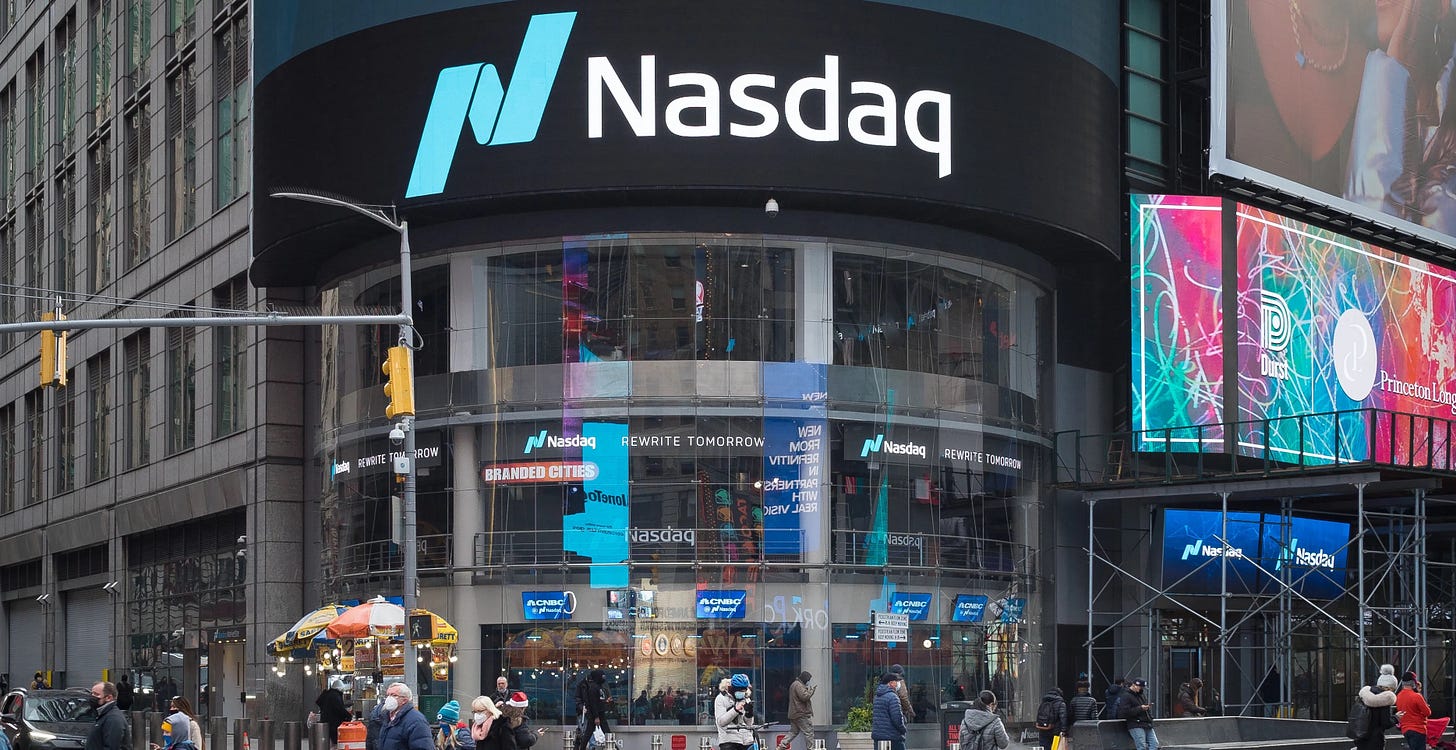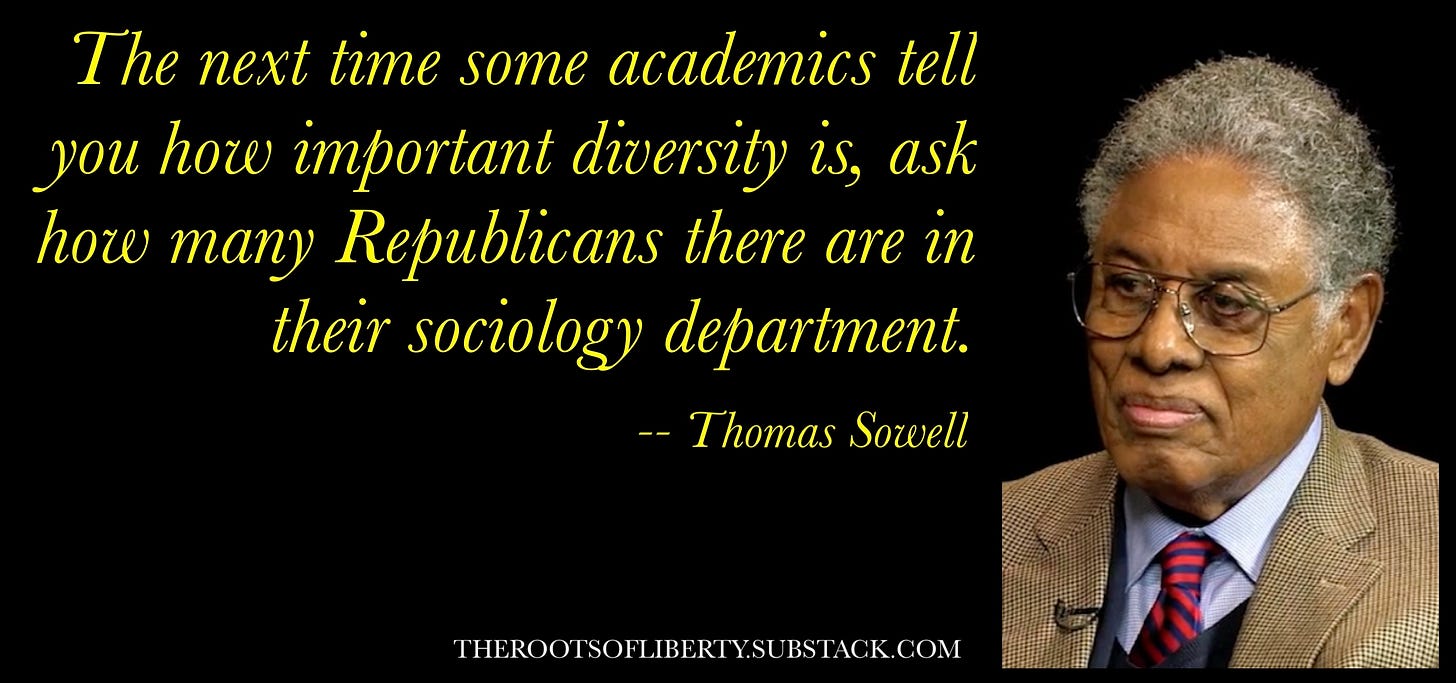Soft Coercion
A couple years ago, the NASDAQ exchange informed its member companies that they have to comply with new diversity and disclosure rules, including a mandate to have at least two "diverse" directors on their board - or explain why they don't.
NASDAQ, being a private entity, should have the right to set such rules... right?
Not so fast.
In a free market, companies would have the liberty to leave NASDAQ for a different exchange if they felt that NASDAQ's rules were onerous or incompatible with their goals or missions or whatever. Stock exchanges, however, are rather deeply intertwined with the government, including control, oversight... and protectionism. Try starting up a competing exchange to cater to the companies unhappy with diversity mandates or other impositions. The government will make it nigh-impossible, unless you also behave as the government wants. Publicly traded companies have their liberty substantially abridged as a result of this interconnection between exchanges and government, so they must comply or risk the doomsday bomb that is delisting.
Welcome to the world of soft coercion.
Banks, also deeply intertwined with, and insured by, government, hold similar power. Good luck trying to run a business without access to the banking system. An obvious example is found in pot legalization. Pot's now an above-board business in 37 states, but since it's still illegal at the federal level, banks are hesitant to accept pot-business accounts, or lend money to them, lest the Feds get on their cases. And, when they do, it's under a much heavier-than-normal compliance burden. One description for this is "underbanked," and it creates frictions that make those businesses harder to run successfully. Lending costs are higher; the businesses end up dealing in - and storing - large quantities of cash, which invites theft and embezzlement and added security expenses; customers who are used to paying with credit or debit cards are deterred; and uncertainty always abounds. ‘Will the Feds raid me? Will they come take my cash, or confiscate what I have in the bank that agreed to work with me?’
Soft coercion.
Back to Big Business. ESG is now the norm, and a government that doesn't care about liberty or free markets will be more than happy to focus its Eye-of-Sauron on those who don't play along.
More overtly, big public-sector investors such as state pension funds, and the elected comptrollers that run them, often invest "politically," eschewing firms that don't align with their policy preferences, demanding ESG and race/gender quotas before investing in companies, and otherwise using the power that comes with discretion over hundreds of billions of dollars to make demands of private businesses.
Soft coercion.
Colleges, underwritten and backstopped with taxpayer money, impose ideological orthodoxy in their curricula, even in mathematics and the hard sciences.
Soft coercion.
You get the idea.
Soft coercion should not be confused or conflated with soft power, a concept that arose in the 1990s. Soft power encourages desired behaviors. Soft coercion punishes undesired-but-legal/protected behaviors via mechanisms apart from direct government force.
All government is force, by the way.
Government is force, pure and simple. There's no way to sugar-coat that. And because government is force, it will attract the worst elements of society - people who want to use government to avoid having to earn their living and to avoid having to persuade others to accept their ideas voluntarily. -- Harry Browne
The Founding Fathers knew a government can't control the economy without controlling people. And they knew when a government sets out to do that, it must use force and coercion to achieve its purpose. -- Ronald Reagan
The Constitution puts limits on government's ability to coerce us directly, much to the dismay of socialists, communists, fascists, corporatists, technocrats, sorta-monarchists, oligarchists, kleptocrats, interventionists, protectionists, Machiavellians, and the rest of the statists (of both Blue and Red flavor) who believe that society can be made better if only the Best-and-Brightest are granted the power to force the rest of us to think and behave as they deem best. Such people, drawn like moths to the flame of power, have proven extremely creative and adaptive in their pursuit of such power. The growth of government (by both major parties), the Left's dominance of cultural matters, and the fruits of advancing technology have enabled a strategy shift to soft coercion.
A private-sector stock exchange wants to demand corporate boards be less old-white-dude? Sure, it’s the private sector, they can discriminate if they want to! Civil rights acts and anti-discrimination laws don't apply to old-white-dudes, after all. A bank doesn't want to do business with customers who say the wrong things? Sure, it’s the private sector, they can pick and choose their customers! Colleges want all courses to be woke, and all students to regurgitate rather than think? Sure, they're independent institutions, they can do what they want!
Not so fast.
If those entities were truly private, if they didn't draw some form of special benefit from government (public funds, protectionism, etc.), then such arguments would hold up. But, they do, and this puts them into the realm of "state actors," entities that aren't truly private-sector, but rather some sort of extension of government power. Public pension fund managers demanding behaviors is more overt, but still "soft" compared to formal government decree.
This is how behavior is compelled nowadays.
Decades ago, when I was a young lad vacationing in Greece, as our family did most summers, I had an interesting chat with a similarly-young woman in about America's "buying" of European governments - an encounter I shared in my earlier days of blogging. That she was a Communist whose father owned a high-end hotel where she had the run of the place, and that her Red rhetoric emerged through mouthfuls of Chateaubriand, was an irony lost upon her, but there was truth in the point. Throw a bunch of money at someone, create a dependence, then demand behavior upon threat of shutting the spigot.
Rich nations have done that all over the world, and our Federal government routinely does that to get the states to do its bidding. Russia is doing that to Germany at this very moment.
That sort of "purchased behavior" is not today's soft coercion. People or companies or nations addicted to the cashflow could still opt out, and go without. Today's soft coercion, on the other hand, leaves much less room for opting out. If you can't do your business without those coercers, if it’s their way or bust, you're stuck bending the knee to their demands.
Things get a bit fuzzier when we look at Big Tech. The link to government is not as robust or obvious as it is in banking or Wall Street, though there is the Section 230 argument, and there is the "public accommodation" argument I made a few weeks ago. There’s also the unfolding story of overt collusion between Facebook and the FBI, but I’ll leave that for another day.
If YouTube demonetizes a channel because it's unWoke or because it is skeptical of Government Science, it is soft coercion, but we have rather less "meat" on the government-intertwining bone to argue that YouTube is a state actor. This is why I'm more skeptical of seeking government redress of YouTube's behavior than of saying that NASDAQ has no right to demand corporate board diversity. The quasi-governmental nature of the latter is far more obvious and overt, and government does not have the right to make the sorts of "freedom of association" decisions that private entities do.
Still, there are plenty of state actors to focus on before we get into YouTube's and Facebook's shenanigans.
The matter of "state actors" traces back to government. Specifically, an activist government that uses its vast powers to coerce behaviors via its state actor intermediaries. It's not unfair to tag Big Banks and Big Business with a "Deep State" epithet, and it behooves us to remember always that Big Government and Big Business, despite the frequent high-visibility head-butting, are more bedfellows than adversaries.
Thank you for reading! If you enjoy The Roots of Liberty, please subscribe (if you have already, thank you!), please hit that “like” button to let me know, please share any article you like wherever you roam the Internet, and please recommend the blog to your friends.
If you really like The Roots of Liberty and want to help keep it rolling, please consider becoming a paying subscriber here at Substack, or at a lighter level as contributor to the blog via Patreon.
Thank you, again, for your support!
Peter.





Awesome Thomas Sowell meme! Good piece - as usual!
Banks can't even limit their choice of customers to ones which are worthy of credit. That "loss leader" gets charged to other customers and shareholders.
If I recall, JPMChase and perhaps another large national bank were forced to take government bailout money in 2009/2010. To boot, Chase was told to buy a large troubled regional bank, AND THEN had to cover penalties that acquired bank had incurred for lending practices of the ex-management team had executed.